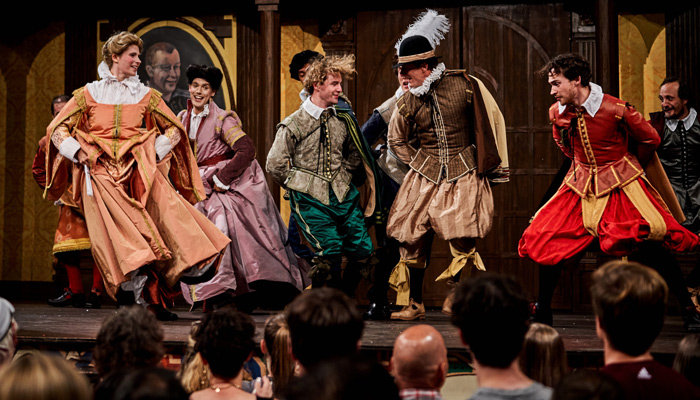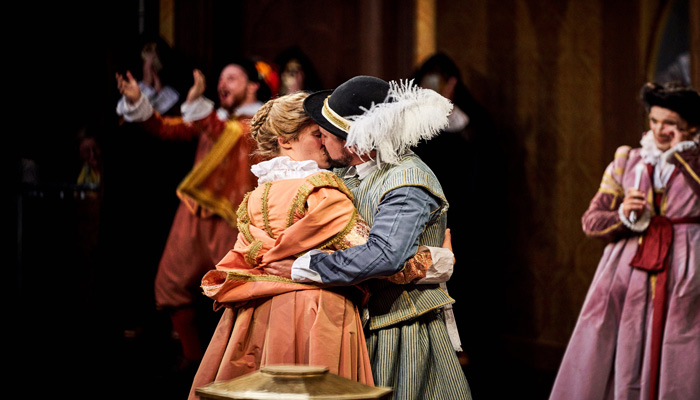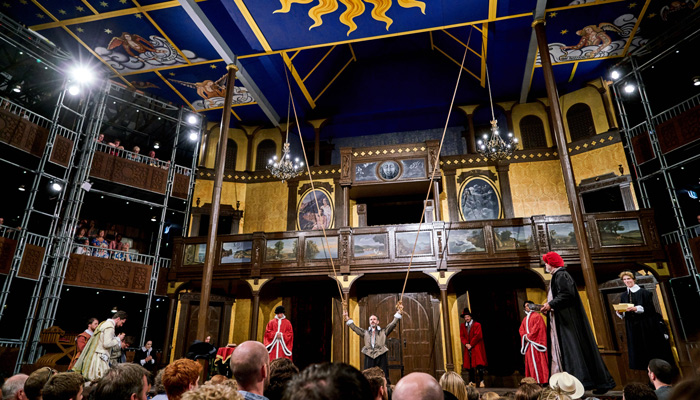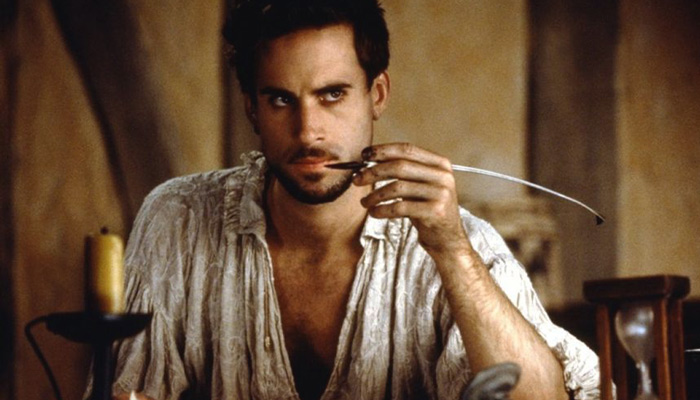Sitting under the stars in the intimate three-tiered space of the pop-up Globe, admiring its façade of a Venetian palazzo, one of the most striking things about it is the exciting possibilities it offers for players to involve the audience in the action. All the legends about the exuberant encounters between Shakespeare’s players and the groundlings at the foot of the stage seem about to come true.

Fair game: the audience - or groundlings as they were known in Shakespeare's time - is drawn into banter with the actors as part of The Buckingham’s Company's comedic take on the centuries-old play.
This intimate space - an ingenious product of contemporary archaeology, computer modelling and learned speculation - is based on the second Globe Theatre built by Shakespeare’s company in 1613-14, and was exploited to its full potential during this week's opening night of the pop-up’s season of The Merchant of Venice. In this production members of the audience were heckled, imitated, and cajoled into bantering with and even romancing the characters.
The groundlings, who were always in the actors’ sights, were fair game throughout as the gaze was turned back on the gazers. This added to the atmosphere of chance in a play which is, as its director David Lawrence has remarked, all about high-stakes wagers, deals and risk-taking.
History and modernity collide
Any twenty-first-century production of The Merchant of Venice must also negotiate the competing demands of history and modernity.
Today’s post-Holocaust world demands that this story of Christian-Jewish enmity be performed in a way that marks a distance from Shakespeare’s time, when Jews were viewed with contempt and distrust and the play’s Jewish moneylender Shylock could be played as a comic caricature. Although Shylock has been portrayed more sympathetically for around two centuries now, the recent global rise in anti-Semitism lends an urgent backdrop to a revival of the play in 2018.
- Show me the ethics! Millennials choose ethical jobs over high salaries
- Mystery of stolen Egyptian artefact cracked by hieroglyphs
- Do mobile phones affect your sleep?
The actor Peter Daubé, of the pop-up Globe’s Buckingham’s Company, continued the tradition of sympathetic portrayals of this famous character. Wearing long robes and the red hat that Venetian Jews were forced to wear to identify themselves, his Shylock projected wariness and injured dignity.
Even when Shylock is at his most implacable, demanding justice in the form of the infamous pound of flesh from the breast of his defaulting debtor Antonio, Daubé lends him the anger of a man who has been spat on too often by his Christian neighbours.

All male cast: The Sydney production of the Merchant of Venice is faithful to Shakespearean tradition where 'boy apprentices' play the women's roles.
When we recall the earlier scene where the Venetians lampoon his grief at the disappearance of his daughter Jessica, we’re reminded of the hypocrisy underlying the Christians’ later insistence that Shylock show mercy to Antonio. The Pop-Up production could have been more emphatic in exposing the cruelty underlying Antonio’s final command that Shylock convert to Christianity. One small gesture, though, in which Daubé lays a trembling a hand across his now bare head, reminded us with quiet force that Christian ‘mercy’ has just stripped this man of faith, identity and community.
This is, however, one of the very few serious moments in this play, which is resolutely comic in its interpretation of Shakespeare’s story.
Physical comedy
The fact that its two most-quoted speeches are Shylock’s impassioned “Hath not a Jew eyes?” (Act III) and Portia’s earnest “The quality of mercy is not strained” (Act IV) can lead us to overlook its many comic moments, but Buckingham’s Company is determined not to let us forget that this play did not start life as an interfaith tragedy.
The production’s comic emphasis extracts hilarity from scenes that are often played in a more muted or arch mode, such as when Portia (played with swaggering wit by Patrick Griffin) and her maid Nerissa (a brilliantly camp Will Alexander) catch their hapless husbands in a carefully-laid trap and then terrorise them with wifely indignation.
The overall merriment generated by this New Zealand-based company was infectious, and the audience laughed along throughout the production.
The scene, however, when the Prince of Morocco sues unsuccessfully for Portia’s hand comes close to the style of an old-school Ali Baba pantomime. Its shrieking retinue of anonymous servants in Berber headwraps and genie pants doesn’t shy away from using ethnic caricature to inject physical comedy into the scene.
Even more bludgeoningly comic is the scene featuring Portia’s other unsuccessful suitor, the Prince of Aragon, in which he is played with an exaggerated limp that has him crashing into the walls. Given Shakespeare’s England was at war with Spain, his audience would no doubt have enjoyed seeing a ridiculous Spaniard; but in a modern production like this one, the caricature seemed overdone and the scene drawn out.

Merriment meets reflection: This latest interpretation of The Merchant of Venice provides plenty of laughter while skillfully creating an opportunity to consider prejudice and justice in modern-day Australia.
Despite these wobbles, the overall merriment generated by this New Zealand-based company was infectious, and the audience laughed along throughout the production.
As one of the pop-up’s designated ‘traditional’ productions, The Merchant of Venice is an all-male show. The female parts are played by the modern-day equivalent of Shakespeare’s ‘boy apprentices’, although some of the men in Buckingham’s Company’s are burlier than the Elizabethan boys, including the 6-foot Māori actor Jade Daniels, who played Jessica alongside a much more diminutive Lorenzo (Patrick Carroll).
Gender puzzle
Despite the physical comedy of this – Jessica carried their heavy belongings, and occasionally also Lorenzo – there was a touching delicacy in Daniels’ rendering. For a modern audience this is a chance to experience the same bodies Shakespeare would have envisaged on his stage, which is especially instructive in a play like this one in which two of the female characters, Portia and Nerissa, cross-dress for part of the story.

New interpretations: English Professor Louise D'Arcens.
The one exception to the all-male cast was Patrick Griffin, who played Portia and whose real name is Sarah Griffin. The decision to include just one woman would have had some audience members puzzling: did the director decide that this clever female character should be played by a woman rather than being appropriated by a man? Was it intended to draw attention to the boy apprentices by offering a conspicuous contrast?
The answer turns out to be different: Griffin herself claims in the pop-up programme that theatre companies in Renaissance England may well have included women passing themselves off as boy apprentices, and she, under her male pseudonym, is representative of this phenomenon. It’s an intriguing proposition, and makes sense of her inclusion in the company, even if one only finds out about it after the fact.
When a play has a long and varied performance history like The Merchant of Venice, one of the great pleasures is seeing the new interpretations it generates. It’s always worth the price of entry to see this great story given fresh life by a company like the Buckingham’s which is devoted to creating a dialogue between the past and the present.
The pop-up’s production showed that this centuries-old play still has the capacity to make us laugh and join in. But The Merchant of Venice also has the power to prompt us in 2018 Australia – the Australia of Border Force and offshore detention – to reflect on our own practices of prejudice and exclusion, and to consider our own country’s application of justice at the expense of mercy.
The Merchant of Venice plays until October 27 with the full program available here.



